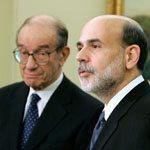
The biggest sovereign bond bubble of all time could soon pop, so bondholders better give up their "implausible assumption" that foreign investors will continue to furnish the capital that keeps the U.S. and Europe afloat, warns financial columnist Ambrose Evans-Pritchard. "It is lazy to think that China, Japan, the petro-powers, and the surplus states of emerging Asia will continue to amass foreign reserves, recycling their treasure into the U.S. and European bond markets," writes Evans-Pritchard in The Telegraph. "These countries are themselves bleeding as exports collapse. Most face capital flight. The whole process that fed the bond boom from 2003 to 2008 is now going into reverse." Woe to investors who misjudge the outcome of this strategic shift, Evans-Pritchard says. Russia has lost 27 percent of its $600 billion in reserves since August. The oil and metals market collapse has left the oligarchs prone. China's reserves dropped $15 billion in October. "Beijing has begun to fret about an exodus of hot money," Evans-Pritchard says. Remember, China's $1.9 trillion cache of foreign bonds is a by-product of holding down the yuan to boost exports. That mercantilist technique is no longer required, as the currency is declining. Beijing needs the money at home in any case to uphold the Chinese economy. Even Japan has slipped into trade deficit. There may be better uses for that money at home, foreign investors are starting to say. – Telegraph
Dominant Social Theme: Problems… they just never seem to end!
Free-Market Analysis: Thanks to Evans-Pritchard who certainly has hard-money sympathies, we learn of another shoe yet to drop. (Well, we learn of it again, anyway.) First housing, then stocks, now bonds.
Of course, to listen to the constant din of post mortems, nothing really went wrong recently but regulation. Had the American Democrat/Republicans not done as they did, then everything would have been OK. Thus, out of the woodwork have emerged all sorts of prescient seers, beginning with the Bush administration which supposedly warned (certain apologists maintain) that Fannie Mae and Freddie Mac were being set up to fail.
The disinformation is breath-taking. Somehow everyone knew that bad regulation was driving the American financial system into bankruptcy and no one was quite able to do anything about it. Geez, a $3 trillion federal budget, a two front war and US legislative and administration helplessness yet reigned supreme. You wonder why someone didn't reserve a block of TV time if the situation was so dire. Grant all of this revisionist history and questions loom larger than ever. If it was only a segment of American mortgages, then why have stock markets collapsed around the world? And if the sovereign bond market now collapses, is this too the victim of overpriced shelter?
One looks in vain for a more modest and sincere explanation, something that deals with the bottom-line fundamental issue – which is the central banks and their endless, destructive hyping of the money supply, as we will continue to write. Yes, indeed, the latest lnflationary supercycle may go all the way back to 1980. We wonder if it doesn't stretch back to 1945. In any event, the idea that so much could go wrong as a result of mispriced housing is stunning indeed. And deserves a more comprehensive explanation. Or at least a little straight talk, somehow, somewhere.

When the bond bubble breaks, as some are now speculating, how much of the Western financial system will be left standing? And what will the result be, ultimately? We can start to see the irregular outlines emerging, and perhaps we will know more in February. But we are relatively certain of a couple of things. Somehow (coincidence no doubt) big-power military confrontations may continue to pick up over the course of this year. And second we would be most surprised if a big push isn't made to dramatically increase financial regulation both locally and globally. This may include a radically revamped Western currency as well. Perhaps an Americas version of the euro will be floated. Call it the Amero – how's that for a name (have we seen it before)? And, finally, only non-mainstream publications will agitate for a return to some sort of honest money. A market-based gold or silver standard certainly makes sense to us, and plenty of others, too, none of whom apparently write for either the New York or London Times. In 2009, common sense seems about as scarce as a business loan.
